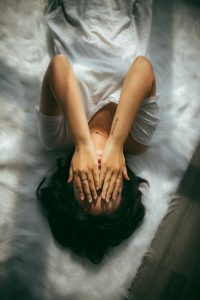
To non-insomniacs, insomnia is as foreign a concept as indigestion is to those of us with iron stomachs. The latter have experienced nausea maybe a few times in life, they’ve had food poisoning or diarrhea, so they know the feeling—but they have no idea what it’s like to be in a perpetual state of gastrointestinal vulnerability. To have to always be aware of what they’re eating or have a lesser capacity for the holiday indulgences that others seem to be able to “stomach” relatively easily.
Conversely, most non-insomniacs have experienced sleeplessness on at least one occasion. Having caffeine too late in the day, an exorbitant amount of life stressors on one’s mind, or just a random night of anxiety, feeling inexplicably wired in anticipation of a potentially exhausting day to come. However, they don’t know what it’s like for this to make up the majority of one’s nights, for it to become a vicious cycle of neuroses around sleep hygiene and schedule decisions, nor the cumulative effect of chronic insomnia versus a bad night here and there.
Insomnia is considered one of the most difficult pathologies to address, not just in Chinese Medicine, but in western medicine and most medical paradigms. There are many moving etiological parts, from the brain’s pineal gland and vagus nerve to adrenal hormones, parasympathetic function, and of course the “food stagnation” pattern. Anyone ever eat a huge meal late at night and sleep poorly? This might be a pile of pizza clogging up the vagus nerve’s pathway for sleep neurotransmitters to smoothly travel along.
While it is important to remain vigilant in uncovering the root cause and holistic pattern of any disease, symptom management, in my opinion, can be equally important in the interim. Diet, sleep, and exercise are a trifecta agreed upon across all medical paradigms, as the holy grail to avoiding disease, so when one is compromised it should be addressed with urgency.
If breathing exercises work for you it generally indicates a less severe root pattern, also offering an opportunity to hone your meditation skills. I recommend either the 478 Breath or this silent kundalini yoga mantra.
If yours is more of a “blood deficient yang ming” kind of insomnia (think waking in the middle of the night or early in the morning and feeling wide awake, but somehow still exhausted), breathing alone will likely not be enough. This is a difficult pattern to treat, albeit do-able, but during the trial-and-error healing process I’d recommend any of the following supplements:
DOC PARSLEY is a melatonin blend, not advisable to use long-term but according to my most respected teachers it is relatively helpful and harmless off and on for brief interims.
SHIZANDRA DREAMS combines western and eastern herbs, the former of which includes valerian root. Again, we do not believe any medications should be taken in perpetuity, but this is okay to use briefly while getting your life and/or brain back to normal operating mode.
Finally, and I have mentors who’d smack me for writing this, but SUAN ZAO REN TANG is a generic formula that has personally helped me in the past. It includes poria mushroom, licorice, chuanxiong root, anemarrhenae root, and zizyphi seed. Its imperfections lie in the fact that zizyphi seed is nourishing, hence sticky, so if the patient bears a great deal of systemic damp heat it may aggravate this. Also, anemarrhenae is very cooling, so if the patient is already cold they might become colder. Western medicine has the luxury of not having to consider such factors. “Some people experience side effects. Some don’t (shoulder shrug).”
Please consult me if you’d like to order any of these or once you begin taking them, so we can execute intelligently, in spite of the reductionist medical recommendations I’ve just shared.


